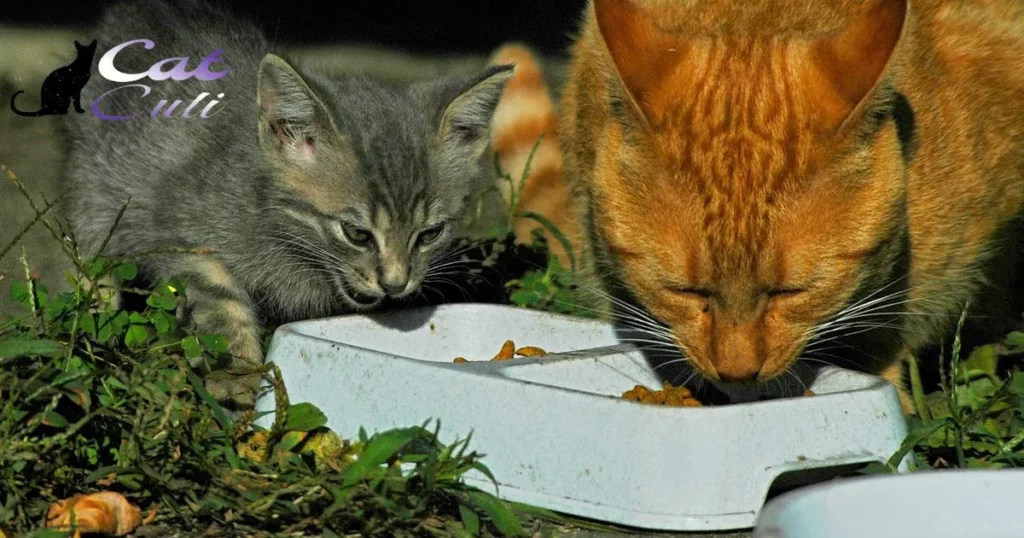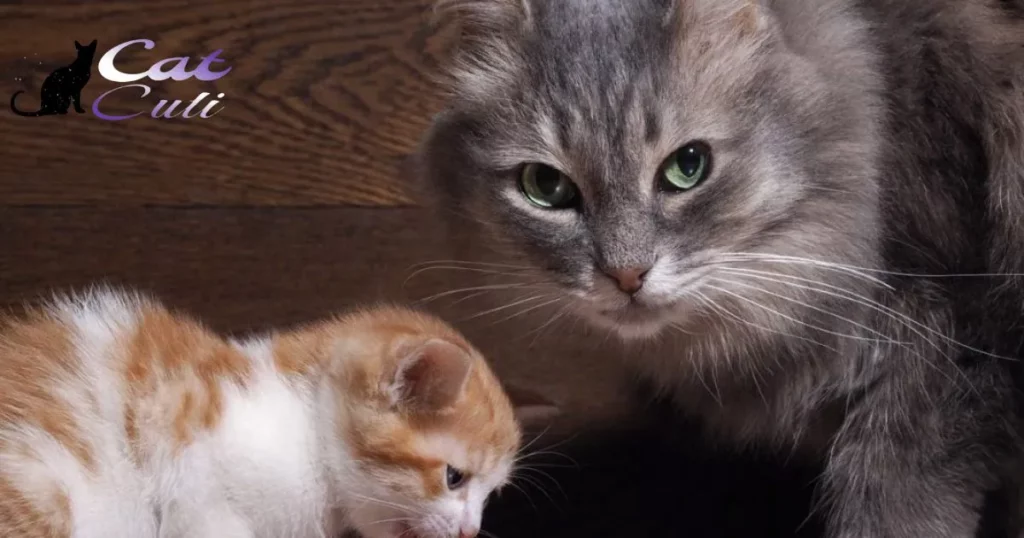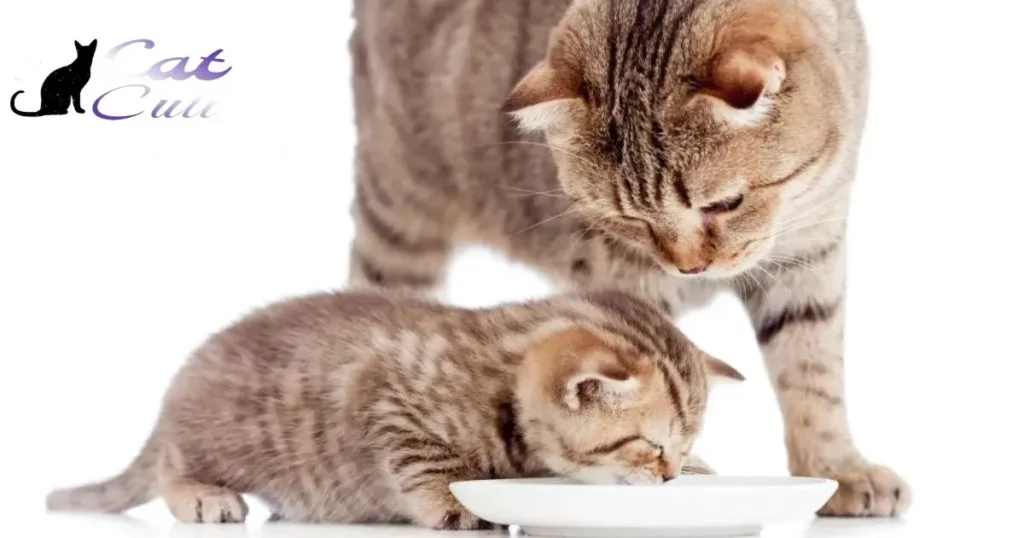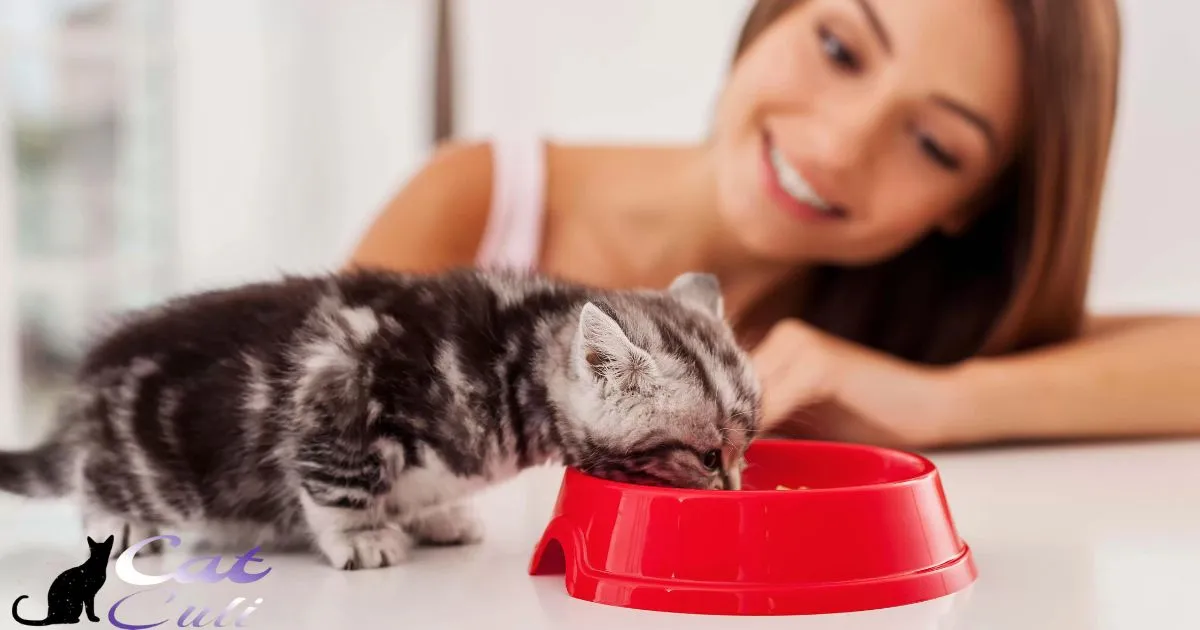Kitten food tends to have higher calories and nutrients, unsuitable for older cats. Transition older cats to adult cat food gradually to avoid digestive issues and ensure they get the right nutrition. Keeping older cats away from kitten food maintains their health and meets their specific dietary needs.
Trying to ensure your older cat sticks to their diet dive into effective strategies on How To Stop Older Cat From Eating Kitten Food and maintain their health. Explore simple methods to keep their meals separate and meet their specific nutritional needs hassle-free.
Stay with us to learn practical ways to prevent your older cat from indulging in kitten food. Discover simple strategies and feeding techniques designed to maintain your older cat’s health and ensure they consume the right nutrients tailored to their stage of life.
Why Is My Older Cat Tempted To Eat Kitten Food?
Older cats might crave kitten food due to its higher protein and fat content, appealing to their taste buds. The flavours and aromas in kitten food might entice older cats, making it tempting to sneak a taste. Changes in their own food or routines might lead to curiosity about the more enticing kitten food.
The higher nutrient density in kitten food could attract older cats seeking extra energy or finding their own food less appealing. This temptation often arises due to the robust flavours and nutrients specifically designed for kittens, piquing the interest of older felines.
Understanding Food Stealing: A Behavioural Perspective
Exploring food stealing behaviour provides insight into animal instincts and hierarchy dynamics. Animals may steal food due to dominance, scarcity, or social cues. Studying this behaviour sheds light on natural instincts and social structures within animal communities.
Understanding food stealing from a behavioural perspective reveals insights into survival tactics and social hierarchies among various species. It unveils how animals adapt to ensure sustenance and maintain social order within their communities, offering a fascinating glimpse into their natural behaviours.
Is It Harmful If My Older Cat Eats My Kitten’s Food?
If your older cat eats kitten food regularly, it can pose health risks. High protein and fat levels in kitten food might strain your older cat’s kidneys or cause weight gain. Ensuring they stick to their specific diet supports their health and avoids potential issues linked to inappropriate nutrition.
Allowing your older cat to eat kitten food occasionally won’t harm them, but a consistent diet can lead to health complications. Kitten food’s high-calorie content might affect your older cat’s weight and overall health negatively. Maintaining their diet ensures they receive nutrients tailored to their age and needs.
What Can I Do To Stop My Cat From Eating The Kitten’s Food?
Use designated bowls for each, placing them in different locations. Gradually transition the older cat to an adult diet to meet its specific nutritional needs. This separation ensures the kitten gets the required nutrients while preventing the older cat from consuming food unsuitable for its stage.
Consider feeding the cats at different times, allowing the kitten to eat undisturbed. Supervise mealtime and remove food once both cats finish eating. Over time, this routine helps in conditioning the older cat to stick to its designated food, keeping both felines healthy.
What To Do If Multiple Cats Have Different Dietary Needs?
- Separate Feeding Areas: Designate specific feeding spots for each cat to cater to their dietary requirements.
- Individual Food Bowls: Use separate bowls for each cat, ensuring they consume their specialized diets without interference.
- Supervised Meal Times: Monitor feeding times to ensure each cat eats their prescribed food and remove uneaten portions promptly.
- Gradual Transitions: If necessary, slowly transition cats to their specific diets to prevent digestive issues.
- Consult a Vet: Seek guidance from a veterinarian to determine suitable diets and feeding strategies for each cat’s unique needs.
What Is The Best Way To Keep A Cat In A Multi-Cat Home From Eating All The Food?

In a multi-cat household, feeding each cat separately helps prevent one cat from eating all the food. Use individual feeding stations or timed feeders to control portions and avoid competition. It’s best to monitor their intake and adjust feeding methods to ensure each cat gets enough food without overeating.
Establishing a feeding routine and using puzzle feeders can also slow down fast eaters, preventing one cat from dominating the food. This way, you maintain harmony among your cats while ensuring each gets their fair share of meals in a multi-cat home.
The Differences Between Kitten And Adult Cat Food
Kitten food contains higher protein and fat to support growth, while adult cat food focuses on maintenance. Essential nutrients like calcium are more abundant in kitten food for bone development. Adult cat food aims for a balanced diet to sustain an adult cat’s needs without excessive nutrients.
Kibble size and texture in kitten food are softer and smaller for tiny mouths and developing teeth. Adult cat food has larger kibbles suitable for stronger jaws. Understanding these distinctions helps tailor the right diet for cats at different life stages.
- Number of Calories: This indicates the energy content in the food, crucial for maintaining a pet’s weight and activity levels.
- Amount of Protein: Vital for muscle development, repair, and overall growth in pets, ensuring proper functioning of bodily functions.
- Fats and Fatty Acids Content: Provides energy, aids in nutrient absorption, and supports healthy skin, coat, and overall body functions.
- Minerals and Vitamins: Essential for various bodily functions, including bone health, immune system support, and overall well-being in pets.
Can Kitten Food Be Beneficial To Adult Cats?
Kitten food might benefit adult cats due to its higher protein and fat content, aiding in muscle maintenance. Prolonged consumption might lead to weight gain if not adjusted for an adult cat’s lower activity levels.
Introducing small portions of kitten food occasionally can offer variety and extra nutrients to adult cats. Yet, be cautious of Much Wet Food Cause Diarrhea In Cats, monitoring their weight and health for a balanced diet blend.
How To Introduce Kitten Food To An Adult Cat
Introducing kitten food to an adult cat involves a gradual transition. Begin by mixing small amounts of kitten food into the adult cat’s regular food. Increase the ratio of kitten food over several days to let the cat adjust comfortably to the new diet.
Try moistening the kitten food to make it easier for the adult cat to consume. This helps in the transition process, allowing the cat to get accustomed to the texture and flavour of the new food gradually. Gradual introduction ensures a smoother shift to kitten food for your adult cat’s nutritional needs.
Why Does My Older Cat Let My Kitten Eat First
In many cases, older cats allow kittens to eat first due to maternal instincts. They might exhibit nurturing behaviour, letting the younger ones eat before themselves. It’s a natural instinct for the older cat to prioritize the kitten’s needs, ensuring they’re fed and cared for.
Older cats might sense the vulnerability of kittens and choose to let them eat first as a way of establishing a bond. This behaviour fosters a sense of protection and guidance, showcasing the nurturing side of the older cat toward the younger one.
Can Adult Cats Eat Kitten Food

Adult cats can consume kitten food, but it’s not ideal long-term. Kitten food contains higher levels of certain nutrients, like protein and fat, essential for kittens’ growth. For adult cats, this excessive nutrition might lead to weight gain or health issues if consumed regularly.
Feeding adult cats occasional kitten food is okay but shouldn’t replace their regular diet. Gradually transitioning them to adult cat food ensures they receive the appropriate nutrients without the risk of excessive intake. Consult your vet for guidance on a balanced diet suitable for your adult cat’s specific needs.
Cat Food For All Life Stages
| Nutrient | Kitten Food | Adult Cat Food | Senior Cat Food |
| Protein | Higher content for growth | Moderate levels | Maintains muscle mass |
| Fat | Higher content for energy | Balanced levels | Controlled for health |
| Vitamins | Enriched for development | Essential for upkeep | Tailored for aging needs |
| Minerals | Increased for development | Balanced essential | Adjusted for absorption |
| Calories | High for growth | Moderate for maintenance | Lower for weight control |
| Feeding Amount | Frequent, multiple meals | Scheduled meals | Controlled portions |
Is Senior Cat Food Bad For Young Cats
Senior cat food might lack necessary nutrients for young cats. It’s tailored for older cat needs, like joint support and fewer calories. Feeding young cats senior food could hinder their growth and development.
Young cats require specific nutrients for growth. Senior cat food lacks these nutrients, potentially impacting their health negatively. Providing food suitable for their age ensures their optimal growth and well-being.
Why Do Cats Eat Each Others Food
Cats may eat each other’s food due to curiosity or a quest for variety. Competition among cats in a multi-cat household might drive them to sample different foods, exploring flavours or asserting dominance. Sometimes, it’s an attempt to secure more desirable meals, especially in groups where one food type is favoured over another.
Cats might mimic each other’s behaviour; seeing one cat eating from another’s bowl can trigger the same action. Environmental factors like limited feeding space or not enough food stations might also prompt cats to eat each other’s food to ensure they get enough to eat.
How To Stop A Greedy Cat
To curb a greedy cat’s eating habits, establish regular feeding times and portions. Use specialized slow-feeders or puzzles to slow down their eating pace and prevent overindulgence. Avoid leaving food out all day to encourage regulated eating habits and discourage greediness in your cat.
Training your cat to associate positive behaviours with mealtime can help control their greediness. Offer treats only as rewards for good behaviour and avoid reinforcing demanding actions. Consistency in feeding routines and positive reinforcement techniques can effectively mitigate a greedy cat’s eating tendencies.
How To Stop Older Cat From Eating Kitten Food
To prevent older cats from eating kitten food, separate their feeding areas and use distinct bowls for each. Gradually transition older cats to adult cat food to meet their specific dietary needs. Keeping older cats away from kitten food ensures they receive proper nutrition tailored to their age.
Utilize feeding schedules where older cats eat separately from kittens to avoid food sharing. Choose adult cat food with balanced nutrients to support older cats’ health. By establishing a routine and offering appropriate food, you can effectively deter older cats from consuming kitten food.
Is it OK for older cats to eat kitten food?

Yes, older cats can eat kitten food occasionally, but it’s not ideal for their regular diet. Kitten food has higher fat and protein levels, which may strain an older cat’s kidneys or lead to weight gain. Gradually transitioning them to senior or adult cat food is recommended for their specific nutritional needs.
Offering older cats kitten food sparingly won’t harm them, but a prolonged diet could pose health risks. Regular consumption might upset their digestive system or cause obesity due to the higher calorie content in kitten food. Opting for food tailored to their life stage ensures they receive appropriate nutrients.
How do I keep my big cat out of my kitten’s food?
To keep your big cat away from your kitten’s food, try separate feeding areas. Place the kitten’s food in an elevated location inaccessible to the larger cat, using a gate or door with a small opening for the kitten to access. Feed them at different times, allowing each cat to eat undisturbed.
Another method is using specialized feeding bowls. Invest in bowls designed to allow smaller animals, like kittens, to access the food while keeping larger animals out. This way, you ensure the kitten gets the nutrition it needs without interference from the bigger cat.
Why is my cat obsessed with kitten food?
Cats may obsess over kitten food due to its higher fat and protein content, appealing to their taste buds. This food offers more calories and nutrients, enticing older cats, but it’s tailored for kittens’ rapid growth. The strong aroma and taste can draw cats in, leading to a preference over regular adult cat food.
The obsession could stem from an instinctual attraction to the rich, nutrient-dense formula. The higher fat content in kitten food might be more enticing, but it’s crucial to transition older cats to appropriate adult cat food to meet their nutritional needs for their life stage.
FAQ’s
At what age do cats stop eating kitten food?
Typically, cats transition to adult food at around 12 months, aligning with the completion of their growth phase.
How can you tell how old a cat is?
Examining teeth, eyes, and behaviour helps estimate a cat’s age. A vet can provide a more accurate assessment.
Do 6-month-old cats eat kitten food?
At 6 months, cats are often weaned off kitten food and gradually shifted to adult cat food for balanced nutrition.
Conclusion
In summary, ensuring your older cat refrains from eating kitten food involves strategic feeding techniques and gradual transitions. By implementing methods highlighted in
such as separate feeding areas and gradual food introductions, you can maintain their health.
Learning how to manage your older cat’s diet not only maintains their well-being but also fosters a balanced feeding routine. Implementing these strategies from How To Stop Older Cat From Eating Kitten Food allows you to provide tailored nutrition, ensuring your feline friend stays healthy and content throughout their life stage.








